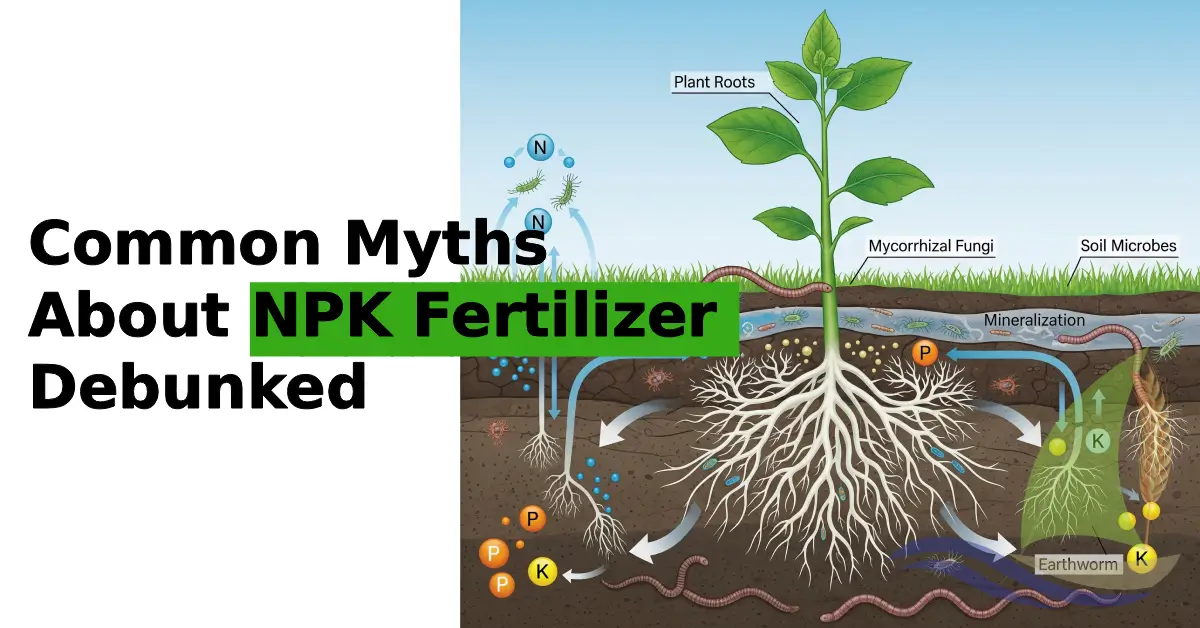NPK fertilizer plays a critical role in modern agriculture, delivering essential nutrients—nitrogen (N), phosphorus (P), and potassium (K)—to ensure healthy crop growth and higher yields. Yet, despite decades of proven benefits, NPK fertilizer is often surrounded by misconceptions that discourage farmers and home gardeners from using it effectively. In this guide, we’ll break down common myths, provide scientific clarity, and show how innovative solutions like Yarafert products can help maximize fertilizer efficiency while protecting the environment.
The Myth That NPK Fertilizer Harms All Soil Life
One of the most persistent claims is that NPK fertilizer destroys beneficial soil organisms. While misuse—such as overapplication—can temporarily affect microbial balance, research shows that when applied correctly, NPK fertilizer supports soil health by ensuring crops develop strong roots and return organic matter back into the ecosystem.
Soil life thrives when nutrients are balanced. For instance:
- Nitrogen (N) promotes leafy growth and supports soil microbial activity.
- Phosphorus (P) encourages root and flower development, directly benefiting mycorrhizal fungi.
- Potassium (K) enhances plant resilience, indirectly protecting soil organisms by preventing crop stress.
Advanced formulations like Biofast Gel (12-12-12 + humic and fulvic acids) combine traditional NPK with organic components, providing both plant nutrition and microbial stimulation. Similarly, SULFOMIX, enriched with micronutrients like Fe, Zn, and Mn, supports soil biodiversity rather than harming it.
? Fact Check: Properly applied NPK fertilizer doesn’t kill soil life—it sustains it by maintaining a balanced nutrient cycle.
Debunking “One-Size-Fits-All” NPK Fertilizer Claims
Another misconception is that all soils and crops can thrive on the same NPK ratio. In reality, different crops require tailored nutrient management plans.
For example:
- Ugarit 27-27-27 + TE is ideal for balanced nutrient-demanding crops like vegetables.
- Ugarit 10-10-40 + TE is suited for fruiting stages, when potassium demand is highest.
- Ugarit 40-10-10 + TE supports leafy crops that require high nitrogen input.



NPK fertilizers come in varied formulations precisely because there is no universal blend that works everywhere. The right choice depends on:
- Soil test results (nutrient levels, pH, organic matter content).
- Crop type and growth stage.
- Climatic conditions and irrigation practices.
Yarafert’s wide portfolio, including Ugarit K-T-S 25 (high potassium and sulfur) or CALCIMAG (N + Ca + Mg for strengthening plant tissues), helps growers move beyond the “one-size-fits-all” myth by offering specialized solutions.


? Fact Check: Tailored NPK fertilizer formulations are essential—customization ensures maximum crop performance and resource efficiency.
Truth About NPK Fertilizer and Organic Farming

A common belief is that NPK fertilizer and organic farming cannot coexist. However, integrated nutrient management (INM) combines organic and inorganic sources for the best results. Many certified organic systems even allow specific forms of mineral fertilizers to correct deficiencies.
Products like Ugarit 10-0-5 + 70% organic matter (humic + fulvic acids) bridge the gap by blending NPK with organic carbon, offering the dual benefits of mineral nutrition and soil enrichment.
Practical integration strategies include:
- Applying compost or manure alongside targeted NPK fertilizers to maintain soil fertility.
- Using SULPHOMIN (N 45% + organic matter 25%) for nitrogen supply while improving soil organic carbon.
- Rotating crops and adding organic residues, complemented by precision-applied fertilizers like Ugarit DKP (33-44) during fruiting phases.
? Fact Check: NPK fertilizer can be part of sustainable organic systems when used responsibly in combination with natural amendments.
Misconceptions About NPK Fertilizer’s Environmental Impact
Critics often blame NPK fertilizers for pollution, eutrophication, and greenhouse gas emissions. While mismanagement can cause leaching or runoff, modern fertilizer technologies significantly reduce risks.
Environmental safeguards include:
- Precision application: Delivering the right dose at the right time prevents excess runoff.
- Enhanced formulations: For example, Ugarit Multi (K + S + Ca) ensures nutrients remain stable and available to crops.
- Balanced ratios: Overemphasis on one nutrient leads to inefficiency, while products like Ugarit 25-25-25 + TE provide uniform delivery.


Moreover, fertilizers themselves are not inherently polluting—it is poor application practices that create problems. With tools like fertigation, slow-release formulations, and crop-specific blends, growers can minimize environmental risks while maximizing yield.
? Fact Check: Responsible use of NPK fertilizer contributes to sustainable farming, not environmental harm.
Clarifying the Safety of NPK Fertilizer for Home Use

Some home gardeners worry that NPK fertilizers are unsafe around children, pets, or edible plants. The reality is that NPK fertilizers are safe when handled according to label directions.
Key safety practices include:
- Wearing gloves when handling granular or liquid fertilizers.
- Storing fertilizers like Super DKP (30-60) or Phosphoric Acid 85% away from direct sunlight and moisture.
- Avoiding overapplication, which can cause leaf burn or soil imbalance.
- Using balanced products such as Ugarit Strawberry (20-25) to ensure safe nutrition for fruit-bearing plants.
When combined with protective measures and adherence to guidelines, NPK fertilizers are just as safe as household cleaning products—effective when used properly, risky only when misused.
? Fact Check: NPK fertilizers are safe for home use with proper precautions, making them ideal for lawns, flowers, and vegetable gardens.
Final Thoughts: Choosing Smart Fertilizer Solutions
NPK fertilizer myths can mislead growers into avoiding highly effective tools that improve productivity, soil health, and profitability. By understanding the science behind NPK and integrating modern, specialized products like Yarafert’s Biofast, , and SULFOMIX lines, farmers and gardeners can achieve both sustainability and high yields.
Key Takeaways:
- NPK fertilizer does not harm soil life when used responsibly.
- There is no one-size-fits-all formulation—customization is key.
- Organic farming and NPK use can complement each other.
- Environmental impact depends on management, not the fertilizer itself.
- Home use is safe when following standard safety practices.
Ready to move past the myths and unlock the true potential of NPK fertilizer? Explore the complete Yarafert product range to find the perfect solution for your crops and soil. Contact our team today for expert advice, tailored recommendations, and innovative solutions to help you farm smarter and grow better.

